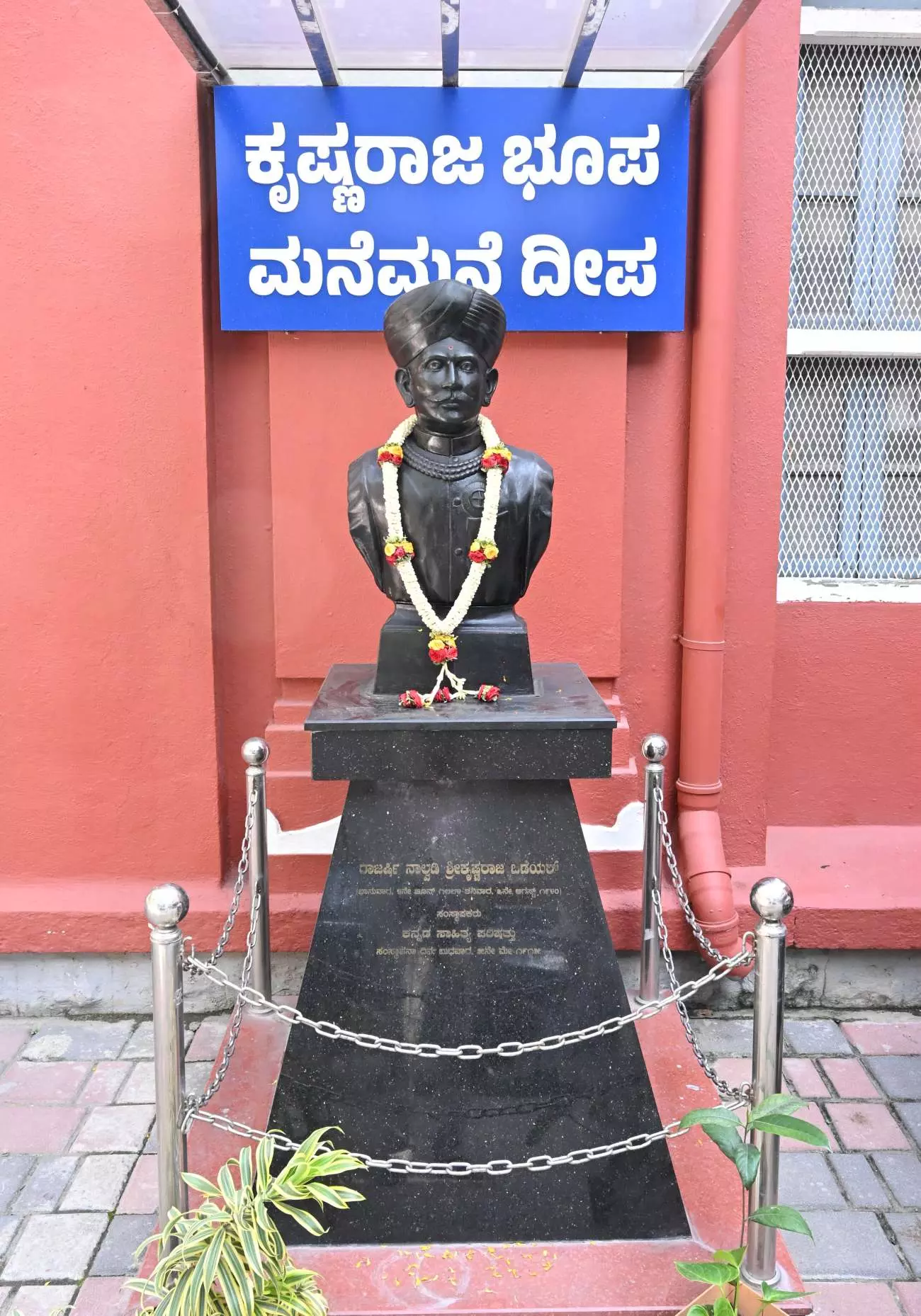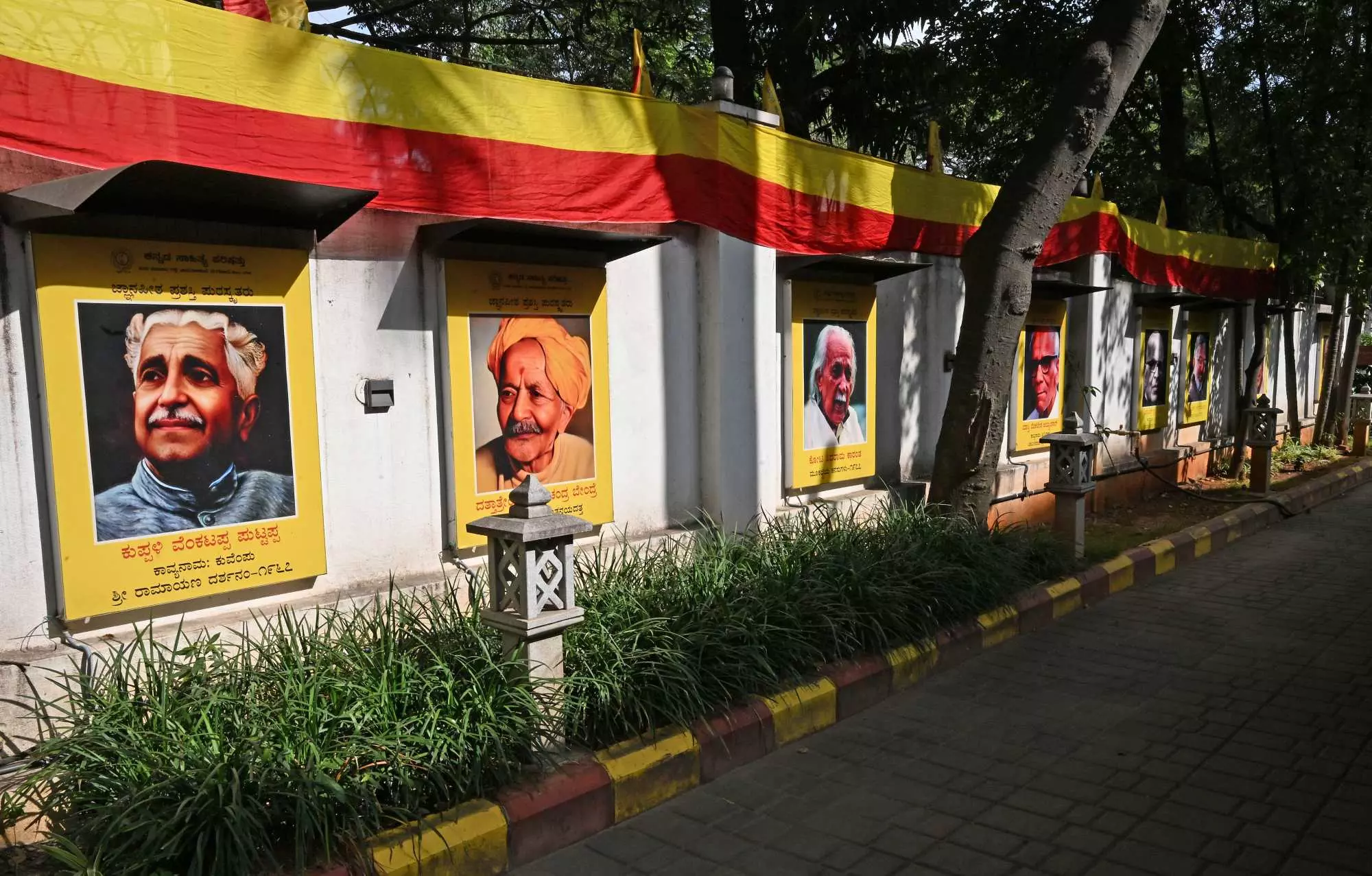
- Home
- India
- World
- Premium
- THE FEDERAL SPECIAL
- Analysis
- States
- Perspective
- Videos
- Sports
- Education
- Entertainment
- Elections
- Features
- Health
- Business
- Series
- In memoriam: Sheikh Mujibur Rahman
- Bishnoi's Men
- NEET TANGLE
- Economy Series
- Earth Day
- Kashmir’s Frozen Turbulence
- India@75
- The legend of Ramjanmabhoomi
- Liberalisation@30
- How to tame a dragon
- Celebrating biodiversity
- Farm Matters
- 50 days of solitude
- Bringing Migrants Home
- Budget 2020
- Jharkhand Votes
- The Federal Investigates
- The Federal Impact
- Vanishing Sand
- Gandhi @ 150
- Andhra Today
- Field report
- Operation Gulmarg
- Pandemic @1 Mn in India
- The Federal Year-End
- The Zero Year
- Science
- Brand studio
- Newsletter
- Elections 2024
- Events
Why ongoing Kannada Sahitya Parishat row reflects a deeper decline in century-old institution
Once a unifying symbol of linguistic pride and intellectual vitality, the Parishat is now plagued by alleged political interference, financial mismanagement and exclusionary practices, leading to a gradual erosion of public trust.

Founded with the visionary objective of nurturing and protecting Kannada language, literature and culture, the century-old Kannada Sahitya Parishat (KSP) appears to have reached its lowest ebb, plagued by allegations of political interference, financial mismanagement and exclusionary practices.The literary body, which once stood as a unifying symbol of linguistic pride and intellectual...
Founded with the visionary objective of nurturing and protecting Kannada language, literature and culture, the century-old Kannada Sahitya Parishat (KSP) appears to have reached its lowest ebb, plagued by allegations of political interference, financial mismanagement and exclusionary practices.
The literary body, which once stood as a unifying symbol of linguistic pride and intellectual vitality, has witnessed a disturbing decline marked by alleged administrative stagnation, internal factionalism, and a gradual erosion of public trust. Developments in the past three years hint at the deterioration and degeneration of the long-cherished values and ethics of the founding fathers.
For the first time in the history of the Parishat, a president of the organisation moved the High Court of Karnataka in March this year, seeking direction to the state government to provide adequate police protection to him, citing threats from various individuals and groups. While the court has directed the state to provide the now-suspended KSP president, Mahesh Joshi, the requested security cover, the government in May this year withdrew the minister of state (MoS) rank and all associated facilities extended to Joshi as the Parishat president. The facilities had been granted to him by the previous Basavaraj Bommai-led Bharatiya Janata Party (BJP) government in Karnataka.
More recently, the Karnataka government last month appointed KM Gayathri, director of the Department of Kannada and Culture, as administrator of Parishat, following allegations of financial irregularities and misuse of power under Joshi. Joshi has been suspended as KSP president pending the report of an inquiry against him. Gayathri is expected to complete the probe within three months.
“If Joshi is allowed to continue as the president of KSP, the image of the KSP would be sullied and there is every possibility of the development casting a shadow on the future of KSP,” writer Ra. Nam Chandrashekar, who has been associated with the Parishat for the past five decades, told The Federal. “To restore the Parishat’s lost glory, what is urgently needed is a revival of purpose, ethical leadership and a genuine emotional investment in the ideals that gave birth to this historic movement,” he added.
Also read: Why NSD fee for acting course in Mumbai has raised concerns of the institute serving the elite
The allegations against Joshi were first made public by the then honorary secretaries of the Parishat, Ne Bh Ramalinga Shetty and Padmini Nagaraj, who resigned from their posts in June, protesting against the “autocratic leadership” and functioning style of Joshi. They also accused Joshi of financial irregularities. Subsequently, prominent Kannada writers, thinkers, and intellectuals, including S.G. Siddaramaiah, Vasundhara Bhoopathi, and Meera Shivalingaiah, have been demanding action against the KSP president.
After being elected as KSP president, Joshi announced a panel to “review and rewrite” the century-old bylaws, claiming the need for modernisation. Activist groups and writers allege that the amendments were an attempt by Joshi to further consolidate his power, such as granting himself the authority to nominate directors with voting rights. These actions led to protests, but Joshi defended his actions, stating that the changes were promised in his manifesto and that the process would be transparent.
Well-wishers of KSP argue that the character of the literary body has changed significantly under Joshi, moving away from the historically liberal principles of the Parishat, owing to political interference and Joshi’s exclusionary practices.
The Karnataka government’s Department of Cooperation had in July appointed an inquiry officer to investigate the allegations against Joshi.
However, according to official sources, the Parishat authorities failed to appear before the inquiry within the stipulated time and did not submit the required documents, prompting the department to recommend the appointment of an administrator.
According to writers and activists privy to details, the entire central executive committee (CEC) of the KSP has appealed to Gayathri to nullify “unilateral decisions” taken by Joshi, allegedly without consulting the CEC. They have also demanded that Joshi’s alleged misdeeds during his 47-month tenure as the president be exposed.
The members have also urged the administrator to annul the alleged ‘unlawful amendment’ made by Joshi to the Parishat bylaws and promised the administrator to extend all support in any kind of inquiry, besides helping the government to conduct the 88th Akhila Bharata Kannada Sahitya Sammelana, scheduled to be held at Bellary in December.
Also read: Why Ottanthullal, a 300-year-old satirical dance-drama from Kerala, is a declining art today
The KSP was founded during the Raj era as a reaction to the increasing prominence of the English language. According to Bengaluru Ithihasa, a well-researched volume edited by scholar Ba Na Sundar Rao, “this trend of English overlooking Kannada prompted the 24th Maharaja of Mysore, Nalwadi Krishnaraja Wodeyar, to take up the cudgels to fight for the supremacy of Kannada language”. The then Mysore Diwan Sir M Visveswaraya and other luminaries, including the likes of writer-poet-philosopher DV Gundappa, got together and decided to found an institution that would work for Kannada identity, language and culture. In a historic mega meet in May 1915, the Kannada Sahitya Parishat came into existence. Ironically, however, HV Nanjundiah, who had presided over the meeting, had initially delivered his speech in English. This drew sharp criticism from the crowd and he ended up apologising for it.
Initially, the Parishat was functioning at a rented place in Chamarajapet and then Shankarapura. The then Diwan Sir Mirza Ismail was later approached to sanction a building for the literary body and it was he who ensured that the Parishat got a bigger space to serve as its office. The Kannada Sahitya Parishat, now operates out of its office in Pampa Mahakavi Road in Chamarajapet.
However, In 1991, when Kannada Sahitya Parishat celebrated its platinum jubilee across Karnataka, journalist turned writer and translator MK Anil, questioned the very foundation of Parishat by describing the attempt to establish Kannada Sahitya Parishat as ‘elite revivalism’. Comparing the KSP with all other institutions of the period, he said, “like other institutions of the time, Kannada Sahitya Parishat was also actively involved in the process of 'decolonisation' within the western liberal framework. Over the years, the Parishat became the haunting ground for mediocrity. Of course, its promotion of mediocrity was subsidised by the government”.

A bust of Kannada Sahitya Parishat founder Nalwadi Krishnaraja Woodeyar. Photo by K Bhagya Prakash
The allegations against Joshi include the purported undermining of the autonomous character of the Parishat, instead of promoting a healthy cultural atmosphere. Former chairman of Kannada Development Authority (KDA) and writer SG Siddaramaiah told The Federal that, “After assuming office, Joshi has created a climate of hostility, mismanagement and repression”. He accused Joshi of failing to maintain transparency by not disclosing financial statements related to Kannada Sahitya Sammelana held at Haveri and Mandya (in 2023 and 2024, respectively), which were “funded by taxpayers’ money”.
Siddaramaiah added: “Instead of making literary conventions a platform for art, literature and culture, Joshi used the prestigious and sanctified platform for political propaganda.”
The suspended KSP president is also accused of allowing the intrusion of party politics, especially that of saffron-clad nationalist parties, and compromising with the institution’s independent and non-partisan character.
The Akhila Bharata Kannada Sahitya Sammelana has been the focal point for many of Parishat’s most serious controversies. At the 86th Sammelana in Haveri, the exclusion of Muslim writers and scholars drew strong criticism, In response a “Jana Sahitya Sammelana” (People’s Literary Conference) was organised as a parallel event to provide a platform for marginalised voices. At the 87th Sammelana in Mandya sparked outrage, when organisers initially attempted to ban non-vegetarian food, equating it with alcohol and tobacco. This was widely seen as an attempt to “saffronise” the secular, literary body.
Joshi also allegedly sidelined women, especially from minority communities, in the poetry session of the Sammelana. Booker awardee Banu Mustaq also protested against this and was instrumental in organising a parallel literary meet in Bengaluru.
A move by Joshi to appoint non-literary figures such as religious heads and politicians as presidents of the Sammelana was also met with criticism.
Also read: Samudaya at 50: Why Karnataka’s theatre collective must reinvent to stay relevant
Controversies surrounding Joshi had, however, started even before he had been elected Parishat president in 2021. Before the polls, he allegedly encouraged the enrollment of a larger number of members in the Pariashat, who became his vote bank. Joshi was elected with a huge margin of 46,168 votes over his nearest rival Shekhar Gowda Mali Patil. Significantly, the number of members eligible to vote in the polls was just 1000 when the Parishat was founded. By 2004, the number of electorates had gone up to 40,000, growing to 62,000 in 2008. It crossed 1,08,233 in 2012 and reached 1,89,048 in 2015. Ahead of Joshi’s election, the number bulged to approximately 3,08,000. The number of eligible voters in the next election is estimated to be approximately 4.50.000. According to Parishat insiders, this made the KSP one of the biggest literary and cultural organisations in the world and no one could come near this number in the next several years. “In terms of membership, Parishat is the largest literary organisation in the country. Total life membership of KSP now stands at 4,00,000 plus, and the number of eligible voters in the coming polls is approximately 3,50,000,” claimed NB Ramalinga Shetty, honorary secretary, KSP.

A wall of the Kannada Sahitya Parishat building adorned with paintings of literary stalwarts. Photo by K Bhagya Prakash
According to a senior writer, the BJP wholeheartedly supported Joshi’s candidature and RSS and BJP workers were deployed to assure victory to Joshi. “Intrusion of Saffron forces did back-seat driving in the affairs of the Parishat, which resulted in the present predicament of Joshi,” said the litterateur, speaking to The Federal on condition of anonymity.
A few Parishat old timers, however, trace the beginning of the KSP’s degeneration to the period of Ham Pa Nagarajaiah in the 1980s
“During the Hampa Nagarajaiah period, a membership drive was conducted to capture power. As the move came under criticism, the government for the first time appointed a commission of inquiry. The B Sham Sundar Committee report set the completion of three years as a criterion for voting rights of members. This prompted those who nurtured ambitions of becoming president to start a membership drive years ahead, to get their support base. This continued even during the period of Jwalanaiah as president, and subsequently, businessmen and bureaucrats, including Harikrishna Punaroor, Manu Baligar and Joshi, resulting in moral and ethical decline of the Kannada Sahitya Parishat. Liberal and intellectual vitality was forsaken, as [over time] the Parishat turned political,” lamented Chandrashekar.
